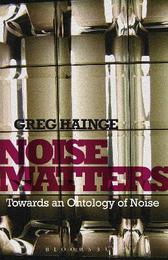
|
Noise Matters: Towards an Ontology of Noise
Paperback / softback
Main Details
| Title |
Noise Matters: Towards an Ontology of Noise
|
| Authors and Contributors |
By (author) Associate Professor Greg Hainge
|
| Physical Properties |
| Format:Paperback / softback | | Pages:240 | | Dimensions(mm): Height 216,Width 138 |
|
| Category/Genre | Film theory and criticism
Theory of music and musicology
Philosophy - aesthetics |
|---|
| ISBN/Barcode |
9781441111487
|
| Classifications | Dewey:152.15 155.9115 |
|---|
| Audience | | Undergraduate | | Postgraduate, Research & Scholarly | |
|---|
| Illustrations |
10
|
|
Publishing Details |
| Publisher |
Bloomsbury Publishing Plc
|
| Imprint |
Bloomsbury Academic USA
|
| Publication Date |
25 April 2013 |
| Publication Country |
United States
|
Description
Everyone knows what noise is. Or do they? Can we in fact say that one man's noise is another teenager's music? Is noise in fact only an auditory phenomenon or does it extend far beyond this realm? If our common definitions of noise are necessarily subjective and noise is not just unpleasant sound, then it merits a closer look (or listen). Greg Hainge sets out to define noise in this way, to find within it a series of operations common across its multiple manifestations that allow us to apprehend it as something other than a highly subjective term that tells us very little. Examining a wide range of texts, including Sartre's novel Nausea and David Lynch's iconic films Eraserhead and Inland Empire, Hainge investigates some of the Twentieth Century's most infamous noisemongers to suggest that they're not that noisy after all; and it finds true noise in some surprising places. The result is a thrilling and illuminating study of sound and culture.
Author Biography
Greg Hainge is Reader in French and Head of the School of Languages and Comparative Cultural Studies at the University of Queensland. He is the author of Capitalism and Schizophrenia in the Later Novels of Louis-Ferdinand Celine and has published widely on cinema, music, critical theory and French literature.
ReviewsThe originality of Hainge's work is in its philosophical method...He systematically unpacks noise to reveal its complexity, and its materiality in the virtual and actual worlds. Traversing many rich and wide-ranging topics, his book moves beyond the potential traps of falling into truisms, offering a highly nuanced reading of noise in all its materializations. -- Sally MacArthur, University of Western Sydney, Australia * Musicology Australia * Across eight chapters, Hainge runs through an irregular but illuminating sequence of cultural situations and texts in which noise proves determining [...]Hainge's study responds to the institutional unmooring of cultural studies with recourse to 'ontology'. What makes his book a more interesting study than many of the other 'ontologies' currently on offer is that, rather than promulgating a return to (low-grade phantasy) objects, Hainge focuses on the anti-object par excellence, the nothing that is noise. Now that's a noise we can all feel, if not in the way Slade intended. -- Justin Clemens * Cultural Studies Review * In the decade since, a stunning range of new offerings from a variety of publishers has become readily available, and sound studies is a far more expansive discipline. This fact is nowhere more evident than in Bloomsbury Academic's excellent sound studies catalog ... the scholarship here shows how adept the cultural study of sound can be at unearthing the thorny political and social tensions that define contemporary culture. -- Nicholas C. Laudadio, University of North Carolina Wilmington * Journal of Popular Music Studies *
|